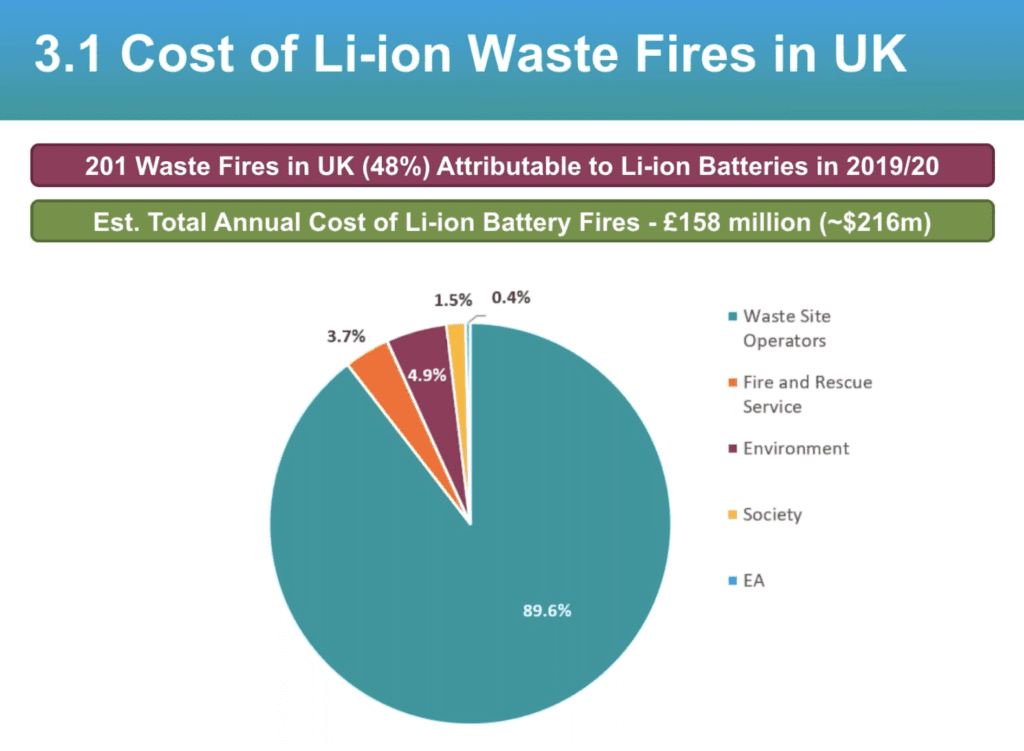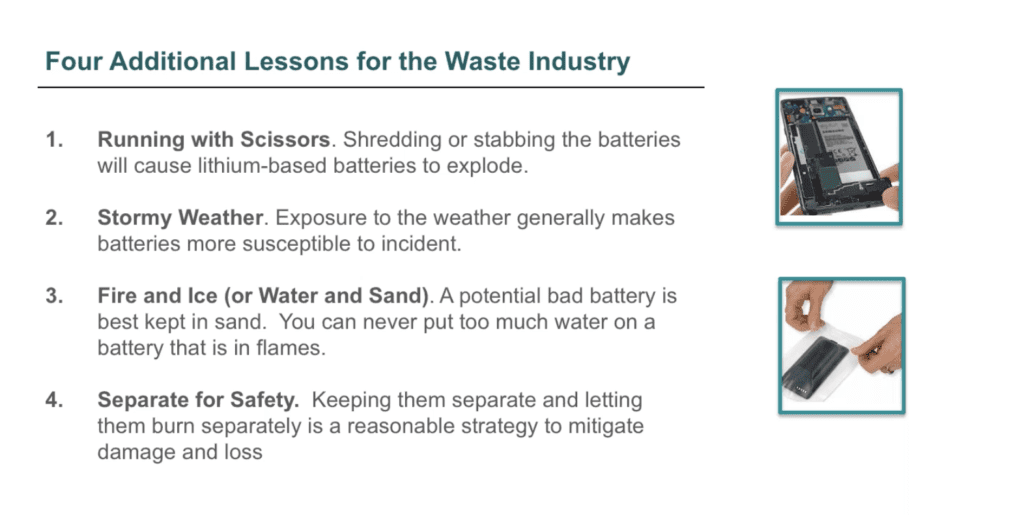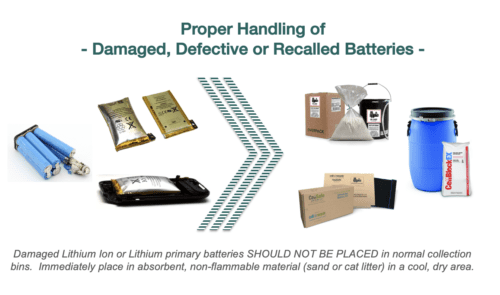Webinar Takeaways: Safety 101—Cutting Lithium-ion Battery Fires in Our Industry
Over the last few years, the global waste and recycling industry has seen an explosion of fire incidents in its facilities due to the wave of lithium-ion batteries entering waste and recycling streams. This ongoing problem is not only posing health and safety risks to employees, but it’s presenting business risks due to the costs associated with these fires and higher insurance premiums.
To gain a better understanding of this problem, Eunomia, a UK-based environmental consulting group, worked in partnership with Environmental Services Association to conduct a report entitled “Cutting Lithium-ion Battery Fires in the Waste Industry.” The report highlights the issue of waste fires, the estimated number of waste fires in the UK, the estimated financial burden on the waste and recycling industry and recommendations for addressing the problem.
The findings of the report were recently discussed by Sarah Edwards, CEO of Eunomia North America; Sophie Crossette, senior consultant of Eunomia; Eric Frederickson, managing director of operations at Call2Recycle; and Kirk Sander, chief of staff and vice president of safety and standards for the National Waste & Recycling Association (NWRA), in a webinar hosted by NWRA.
During “Safety 101: Cutting Lithium-ion Battery Fires in Our Industry,” Edwards explained that lithium-ion batteries are entering waste and recycling streams at a fast pace because the cost of the batteries has decreased 88 percent in the last 10 years; a wider range of consumer products are equipped with lithium-ion batteries; citizens are placing batteries and electronics in their recycling bins and hoping they eventually get recycled; and there’s a general lack of consumer awareness.
These factors are mentioned in Eunomia’s report and have ultimately led to some “scary big instances,” according to Crossette.
“We set up the [report] with two key aims: to estimate the number of waste fires and to attribute those fires to lithium-ion batteries to get an understanding of what they might cost the sector and the wider economy,” she said. “We also wanted to look at international best practices to see what measures have been successful elsewhere and if they were something we could do to get lithium-ion batteries into their correct disposal locations.”
The report, which focuses on waste collection, unveils that from 2019 to 2020, there were approximately 201 waste fires in the UK, 48 percent of which were attributable to lithium-ion batteries. These fires have a combined estimated price tag of $216 million per year, but Eunomia thinks that number is actually much higher due to unreported incidents and uncollected data.

“One of the key things we wanted to look at is where the financial burden lies … and unsurprisingly, we found that 90 percent of costs are carried by the site operator, and that includes the costs associated with material damage, business interruptions and resources to deal with an incident,” said Crossette. “That number doesn’t include money operators have already spent on installing fire suppression systems, detection systems and other mechanisms to stop the spread of fire or the cost of insurance, which is going up year over year.”
To help ease the burden on these operators and to reduce the number of fires sparking from lithium-ion batteries, Eunomia is exploring short-term measures such as expanding curbside collection of electronics and batteries and increasing the profile of community drop-off points. Eunomia is also looking into long-term measures such as banning batteries and electronics in trash bins, including batteries in extended producer responsibility (EPR) legislation, rolling out a deposit return system and working with manufacturers on product designs.
Call2Recycle, one of the leading consumer battery recycling and stewardship programs in the U.S., is also working to reduce battery fires and boost consumer awareness. Since 1994, Call2Recycle has been collecting and recycling approximately 3 million to 4 million pounds of lithium-ion batteries per year.
During the webinar, Fredrickson shared that in order to run a successful consumer battery collection and recycling program, you should follow these 10 principles:
- Any government mandate should include all portable/consumer batteries.
- “Covered batteries” should be based on weight.
- No organization should be required to collect.
- Collection sites must complete a cursory safety training tutorial.
- Any program for battery collections must take into account internet sales.
- Landfilling used batteries must not be an option and must be banned.
- Batteries should be banned from curbside recycling bins.
- Regulatory bodies must be motivated to enforce participation by obligated manufacturers/brand owners.
- Participating collection sites must prominently display their willingness to accept used batteries.
- Program performance metrics should focus on accessibility and convenience rather than collection rates.
Additionally, you should help consumers understand the following important lessons to ensure they are preparing their batteries for safe and proper disposal:
- A spent battery isn’t dead, as used lithium-ion batteries can often maintain more than 80 percent of their original charge.
- Non-removable batteries should not be removed, as lithium polymer batteries without hard cases are susceptible to damage.
- Positive terminals should be protected with tape or placed in a clear, sealable bag.
- Properly and safely dispose of your batteries in a dedicated collection container or site.
And lastly, the waste industry should take into consideration the following lessons:

While these efforts from consumers and the waste industry can make a huge difference, some states are putting the pressure on marketers, producers and brand owners via EPR battery laws. Currently, eight states have EPR laws for rechargeable batteries—Minnesota, Iowa, New York, Vermont, Maine, New Jersey, Maryland and Florida. Additionally, California has a retailer-based EPR law and disposal ban, Vermont has the only primary battery bill in the country and Washington, D.C., recently passed the nation’s first-ever all battery bill with extended EPR for primary and rechargeable batteries.
As we process further into 2021 and beyond, we could see similar legislation go into effect in other states.
Interested in learning more? Listen to a recording of the webinar here.

